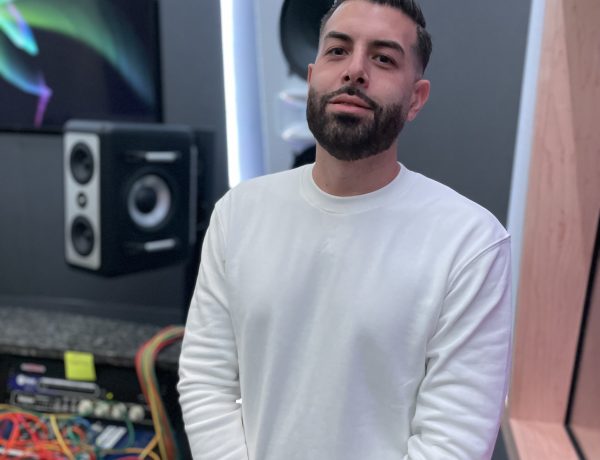One of my personal favorite features is back—Bands Interviewing Bands! In this unique feature, we take two bands and have them interview each other about everything and anything having to do with the recording process, industry insight, touring, getting fans out to show, and other questions that only other artists would know to ask. Catch our latest interview with Septacy and Trace Repeat—two Bay Area bands with two very different sounds, and follow them and get to know their music at the links below.
Trace Repeat: Your Bandcamp says you guys recorded your last record Bookends at “Dirt Room Studios in El Cerrito, A Cabin In The Woods, and Wherever The Hell Else We Could Find.” How did you pull that off?
Septacy: The biggest logistical challenge was recording vocals. None of us live in the quietest of places, so vocal isolation was a huge hurdle to clear. Luckily, my parents were amazing and let us use their cabin in the Sierras to track demos and eventually vocals for the final record. It was really freeing being able to track vocals into the wee hours of the night with no one around. It was also great being able to get out of the Bay and away from day-to-day life for a few days at a time to focus on the record and having fun hanging out with each other. You can see the lighter side of these trips in our video for “Polaris” that we shot during one of these trips up to the cabin.
All in all, it was an incredibly lengthy process, but it allowed us a lot of room to experiment than we would have had in a traditional studio. I would also be remiss to not mention the magical work that Jon Devoto did in mastering the album.
Septacy: What’s the strangest show/venue Trace Repeat has found themselves at? In my experience, the best show stories, if not always the best shows, start with something being weird about the gig.
Trace Repeat: I think my favorite “unusual” venue that we have done is our Funky Friday residency out in Oakland at Independent Brewing. It’s the kind of spot where you see the stage and think “there’s absolutely no way a seven-piece band is gonna fit here.” We do some serious human Tetris shuffling to make it work, though (hah)! We’ve been doing the residency every last Friday for about a year and a half now, and it’s been a big exercise in restraint, really. It takes a lot of self-control to fit a seven-piece band into a really tiny room and NOT drive everyone out the door, covering their ears.
Trace Repeat: I know you mixed the Septacy record yourself (I did a lot of the editing on our record, too), and I know it’s pretty difficult to separate the musicality from the mixing process. What did you do to keep the mixing process separate from the musicianship?
Septacy: I’ve been self-recording and releasing my own solo material for almost a decade now. I can’t say specifically that I have a process in place to put on my engineer hat. Any engineer who has ever worked on their own material, especially in a band situation, will tell you that the biggest pitfall when mixing yourself is that you will always be tempted to turn your own parts up too high in the mix. If you’re the singer or drummer, that’s not the worst problem in the world, but when you’re the bass player, that can be dangerous.
With Bookends, it helped that we had such a long production cycle (three years from demoing to finished product). This allowed me to work on mixing individual songs as we finished tracking them. Usually, I wouldn’t start working on mixing a song until months after I had tracked my parts, so it was easier to put my ego in a different room and focus in on making the songs sound right. With as varied a record as Bookends, having the time to focus on songs individually was an invaluable luxury.
Septacy: The production on every song I’ve heard from Oaktown Sound is phenomenal. It really captures a live club feel. Other than just being fantastic players, which you guys absolutely are, was there anything special you guys did in the studio to maintain the organic, “live” feel that the songs have?
Trace Repeat: Yes! Catching the “live” feel was definitely one of the biggest challenges we had when we recorded the record. Since so much of our show is involved in the visual experience, recording the album was really about figuring out how to capture that visual experience in a 30-minute record. Zach’s epic bass faces, the sweat pouring off of my face, the acrobatic jumps David manages while playing a trombone. They were all things we aimed to capture on the record.
Trace Repeat: The drummer on Bookends is absolutely shredding it up. Same with the whole rhythm section, really. What was your process for capturing that animal energy in the studio?
D’awww. You’re making me blush. Also, how did you know that Jason was a muppet? The secret is out!
Funnily enough, “animal energy” is far from how I would describe our drummer, Jason. He’s one of the kindest, least intense people all of us have ever known. He sure does know how to hit a drum, though. I think there were three things that really helped us capture a more intense feel in the rhythm section. First off, our co-producer and tracking engineer Justin Alquist did a great job mic-ing, tracking and editing everything together.
I think there were three things that really helped us capture a more intense feel in the rhythm section. First off, our co-producer and tracking engineer Justin Alquist did a great job mic-ing, tracking, and editing everything together.
Secondly, we were able to track drums, bass, and piano live in the same room together, so we were able to communicate non-verbally with each other while tracking and actually play together instead of just playing parts to click individually.
The third thing was a lesson that Jason and I learned while recording an album for another band we’re in, Sin Silver and the Avenue, a few years ago. During pre-production, the producer of the album gave us one big note that has helped us immensely in the studio ever since. When tracking drums, the best approach is to over-emphasize your dynamics compared to playing live. If you really want a part to sound big on tape, play it even bigger in the studio and let the tracking/mixing engineers reign in the dynamics.
Septacy: What have your observations been when playing outside of the Bay as compared to the Bay Area, especially when you guys hit SxSW? Which things were better? Worse?
Trace Repeat: Austin is a whole different world out there, especially during SxSW. There’s live music on every corner and in every bar. Basically everywhere you go, there’s a freaking PHENOMENAL band playing. It’s sort of a vibe that I think we can create here in Oakland too, the way there’s this really great appreciation for live music everywhere you go. I feel like if we (Trace Repeat) just strive to put some dope funk in every bar we play at, we’ll just become “that funk band that’s in every brewery in Oakland.”
Trace Repeat: What has your experience been like as a Bay Area band based in Oakland? Do you get a lot of San Franciscans that don’t come out to Oakland cause it’s “too far” (cause we definitely do!)?
Septacy: The Bay Area is challenging as a whole because there is so much to do, and so much amazing art to explore that on any given night; you end up competing with a lot of other acts that probably deserve just as much attention as whatever you are doing. While this does make it harder to convince people to cross a bridge and come watch you play music instead of, say, binging Friends on Netflix, it also presents a unique opportunity to branch out and meet other artists who share your sensibilities and understand how important it is to give back to your scene. Some of our most avid listeners are fellow musicians we met either while sharing the stage, or showing up and introducing ourselves. One of the most important lessons we have learned as a self-promoting artist is that if you actively give to your scene, it will give back to you in ways you would never expect.
Septacy is a 5-piece progressive rock band hailing from Oakland, California that, much like fellow Bay Area natives Green Day and Metallica before them, aim to carve their own unique path through the larger music scene. Their sound can be described as both melodious and chaotic, a dichotomy they fully embrace in their songwriting and on the stage. They just released their brand new music video for “The Clouds Above The Giving Tree,” of their newly released Bookends.
Follow:
Facebook: https://www.facebook.com/Septacy/
Twitter: https://twitter.com/septacy
Instagram: https://www.instagram.com/septacy/
YouTube: https://www.youtube.com/channel/UCxcnsVse2BKhVumNCK1TD4w
Trace Repeat is a 6-piece Oakland based funk and soul band (think: Bruno Mars) who are not only bringing you music that’ll get you up and moving (it is seriously catchy), but that brings attention to a much larger issue—Asian American stereotypes. It’s a cause that has gained them attention on NBC News, The Huffington Post, and Mother Jones, and led to the funding (and then some) of their IndieGoGo campaign within the first week of launching, resulting in their campaign being featured on IndieGoGo’s trending page. Their new album, The Oaktown Sound, sees them reviving the aesthetics of their Motown forefathers: Marvin Gaye, Stevie Wonder, and the tempting Temptations, to create a throwback album packed with James Brown references, Al Green harmonies, and Prince vocal runs. It’s also an album that pays homage to their roots—Oakland. Grab The Oaktown Sound when it drops on September 22.
Follow:
Website: http://TraceRepeat.com
Facebook: http://facebook.com/TraceRepeat
Twitter: http://twitter.com/TraceRepeat
Instagram: http://instagram.com/TraceRepeat
Youtube: http://youtube.com/TraceRepeat
Indiegogo: http://igg.me/at/TraceRepeat
Read more Music News on ClicheMag.com
Bands Interviewing Bands: Trace Repeat (top) photo credit: Nathan Lu. Septacy (bottom) photo credit: Ricky Marasigan



